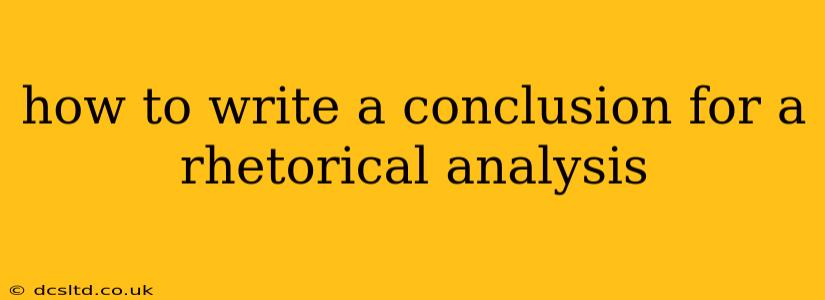How to Write a Conclusion for a Rhetorical Analysis: Leaving a Lasting Impression
A strong conclusion to a rhetorical analysis doesn't just summarize your findings; it elevates your argument, offering a final, insightful perspective. It's your opportunity to leave a lasting impression on the reader and demonstrate the significance of your analysis. Here's how to craft a compelling conclusion:
1. Restate Your Thesis (But Don't Just Repeat It):
Begin by subtly restating your thesis, but avoid a simple rehash. Instead, rephrase your central argument in light of the evidence you've presented. Show how your analysis has strengthened or nuanced your initial understanding of the text's rhetorical effectiveness. For example, if your thesis argued that the author uses pathos to manipulate the audience, your conclusion might state something like: "Ultimately, while [author's name]'s skillful deployment of pathos undeniably resonates with the audience, a closer examination reveals a strategic manipulation that ultimately undermines the argument's credibility."
2. Summarize Key Findings (Without Being Repetitive):
Briefly summarize the key rhetorical strategies you analyzed and their impact. Avoid simply listing them; instead, connect them to your overall argument. Focus on the significance of these strategies and how they contribute to the text's overall purpose and effect. You could say something like, "The strategic use of vivid imagery, combined with appeals to shared values and carefully constructed logical fallacies, effectively persuades the target audience, albeit through potentially deceptive means."
3. Offer a Broader Significance (Go Beyond the Text):
This is where your analysis truly shines. Connect your findings to broader contexts, themes, or implications. How does your analysis of this specific text contribute to a larger understanding of rhetoric, persuasion, or the cultural context in which the text was created? Consider these possibilities:
- Implications for similar texts: How might your findings apply to similar works by the same author or within the same genre?
- Societal or cultural impact: What are the broader implications of the rhetorical strategies employed? How do they reflect societal values, biases, or power dynamics?
- Future research: Suggest areas for future research based on your analysis. Are there unanswered questions or unexplored aspects that warrant further investigation?
Example: "The effectiveness of [author's name]'s use of emotional appeals in this speech highlights the enduring power of pathos in political discourse. This analysis suggests a need for further research into how similar techniques are employed in contemporary political rhetoric, particularly in the age of social media, where emotional manipulation can have far-reaching consequences."
4. End with a Memorable Statement:
Conclude with a concise, impactful sentence that leaves a lasting impression on the reader. This could be a thought-provoking question, a powerful statement that summarizes your overall argument, or a call to action. Avoid clichés and ensure it aligns with the overall tone and style of your analysis.
What to Avoid:
- Introducing new information: Don't introduce new evidence or arguments in your conclusion.
- Overly summarizing: Avoid simply restating what you've already said.
- Apologizing for your analysis: Be confident in your findings.
- Ending abruptly: Your conclusion should feel like a natural culmination of your argument.
By following these guidelines, you can craft a conclusion that not only effectively summarizes your rhetorical analysis but also leaves a lasting impact on your reader and elevates the overall quality of your work.
